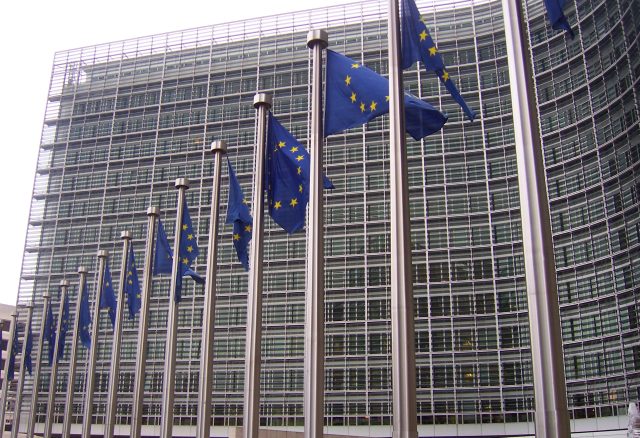
"Modern copyright rules fit for the digital age" is how the European Commission describes its proposals for the first major overhaul of EU copyright law since 2001. But a wide range of startups and industry, academic, digital activist and human rights groups believe that key elements of the proposals will cause serious harm to the functioning of the Internet in the EU and beyond. A vote taking place next week in the key European Parliament JURI committee will determine the likely shape of the law.
The most contentious element is Article 13 of the proposed directive (EU-speak for law). It seeks to make Internet services that host large amounts of user-uploaded material responsible for policing their holdings to prevent copyright infringement. Until now, companies have been able to draw on the safe harbor protection in the EU's e-commerce law, which online services enjoy when they are "mere conduits." The new copyright directive would withdraw that protection for any service that "optimizes" content, which includes things like promoting, tagging, curating, or sequencing a site's contents—most major online services, in other words.
Legal and technical problems
In the future, sites would have two options. They could enter into a licensing agreement for all the content uploaded by their users, although the proposed law does not explain how that could be done for fragmented markets where there is no single licensing body. Alternatively, online services must "prevent the availability on their services of works or other subject-matter identified by rightsholders."
The original text from the European Commission speaks of using "content recognition technologies" to achieve that. But the other key legislative bodies of the EU—the European Parliament and the Council of the EU, each of which produces their own versions of the proposed text, which are then reconciled in the so-called "trilogue" negotiations—avoid using this description. A recent version of the text from the European Parliament JURI committee says, "The implementation of measures by service providers should not consist in a general monitoring obligation."
That change is because critics pointed out that the EU's e-commerce law specifically forbids EU countries from imposing "a general obligation on providers... to monitor the information which they transmit or store." However, there is no other way of proactively blocking any unauthorized copies before they are posted without checking every single upload against a list of copyright works, and that requires general monitoring.
Alongside these legal issues, there are serious technical problems with the approach. The volume of user uploads is such that the filters will have to be automated. But navigating the subtleties of copyright law—things like fair use—is hard enough for courts, let alone algorithms. Automated systems inevitably make mistakes, and the risk of financial penalties means that they will be written to err on the side of caution by over-blocking material. This is likely to have a chilling effect on free speech in the region, and on the EU public's use of copyright materials in the production and sharing of memes, parodies, and criticism. Public domain material is also likely to be blocked.
The EU recognizes that general upload filters will be onerous, and it intends to allow smaller companies to take down material retrospectively instead. EU politicians have also started adding explicit carve-outs for things like "online encyclopedias"—Wikipedia, in other words—and "open source software developing platforms." But it is not clear whether the latter exemption would apply to GitHub, say, since it hosts some software that is not open source. Adding in such exceptions makes the directive's text increasingly complex and hard to interpret, which is likely to lead to years of court cases trying to clarify its meaning.
An important question is whether the chilling effects, implementation costs, and legal uncertainty that Article 13 brings with it are worth it. Unpublished research carried out on behalf of the European Commission at a cost of $400,000 suggests that unauthorized uploads are not a pressing problem: "In general, the results do not show robust statistical evidence of displacement of sales by online copyright infringements."
Article 11
The other hotly contested section of the proposed law is Article 11. This is the "snippet tax," which seeks to make companies pay when they use even short extracts of text from news publications, as is common today on social media and elsewhere. A "Mythbuster" put out by European media companies speaks of "unauthorized large-scale reuse of publishers' content" as if copyright does not apply to newspapers. It does, of course, which means that publishers already have the legal means to pursue such large-scale unauthorized use. Extra protection for even the shortest snippets will impoverish the public sphere by discouraging the sharing of news.
A technical solution to stop search engines like Google from indexing content on news sites exists in the form of the robots.txt file. The fact that publishers don't adopt this simple means to block search engines is because publications derive considerable benefit from snippets of their stories being listed in search results. That was demonstrated when both Germany and Spain brought in national versions of the proposed snippet tax. Germany's law proved so bad for publishers that they gave Google a free license to index their publications. In Spain, the situation was even worse. Since payment was mandatory, Google closed down the Spanish version of Google News completely (Google search remained). Traffic to Spanish newspapers declined as a result, with studies suggesting falls of between 6 percent and 30 percent.
Although there is little risk that hypertext links themselves will be taxed—the original draft law has been clarified on this point—there is likely to be a reduction in sites linking to newspaper articles and a loss of traffic for publishers. Revenue from the snippet tax will probably be small, as the German experience shows.
Many have come out against the snippet tax, including more than 100 EU politicians, 200 European legal and academic experts, small publishers, and one of the European Parliament's own research departments.
reader comments
167